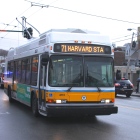Boston Marathon Bombing
Buses to Start Using New Red Lanes on Mt. Auburn Street Soon, Also Impacts Bikes, Cars
|
The following information was provided by the MBTA and Town of Watertown:
Beginning the week of Oct. 15, the Town of Watertown, the City of Cambridge, the MBTA, the Mass. Department of Conservation and Recreation (DCR), the Institute for Transportation and Development Policy, and the Barr Foundation will roll out a bus priority pilot funded by a grant from the Barr Foundation to bring elements of Bus Rapid Transit (BRT) to the Mount Auburn Street Corridor, serving MBTA routes 71 and 73, as well as employee shuttles. The project will feature painted bus and bicycle only lanes – primarily on Mount Auburn Street between Cottage Street and Coolidge Avenue in the inbound direction – as well as signage and signal changes to create faster, more reliable service for 12,000+ daily bus riders while improving traffic flow for everyone. The partners will host an official launch event with speaking program on the morning of Oct.


